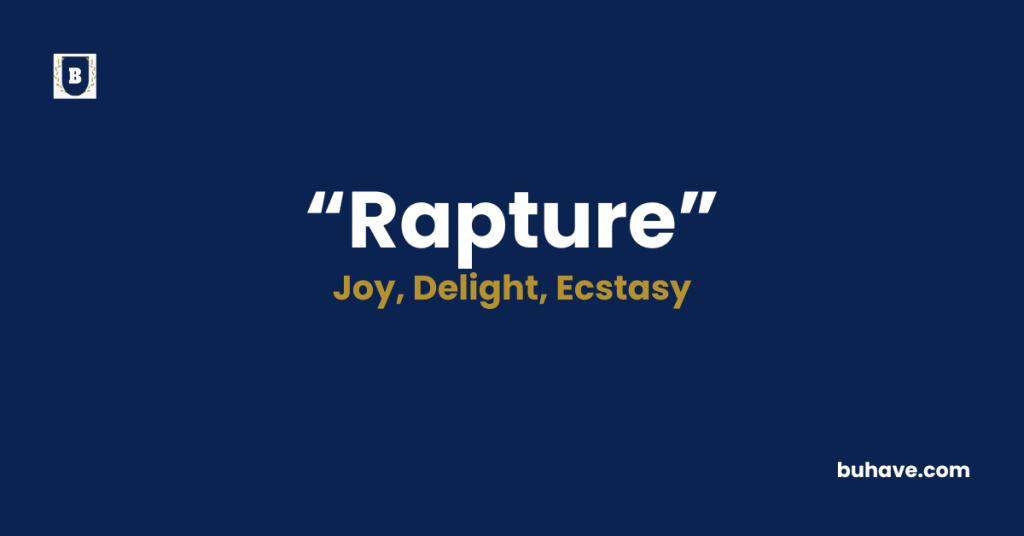The word ‘Rapture’ (Noun) refers to a state of intense joy, delight, or emotional ecstasy—often so overwhelming that it lifts you out of the ordinary experience. In this guide, you’ll discover the full definition, etymology, real-life usage, synonyms, antonyms, and answers to common questions about using “Rapture” correctly in modern language.
Rapture Explained in Depth
A complete and detailed guide to the words Rapture including meaning, definition, examples, etymology, synonyms, and antonyms.
Meanings of Rapture
Rapture describes a feeling of such intense pleasure, happiness, or awe that it seems to transport you beyond everyday reality. When someone is in rapture, they’re entirely absorbed in a positive emotional experience—whether it’s due to music, love, beauty, or a spiritual moment.
This word often paints a picture of emotional elevation. Imagine someone listening to their favorite symphony with eyes closed, a smile on their face, lost in sound—that’s rapture. Or think of lovers sharing a quiet, meaningful moment where everything else fades away—that, too, is rapture. It can be personal, romantic, artistic, or even religious in context.
Definition
Rapture refers to a feeling of overwhelming joy, delight, or ecstasy the kind of happiness that sweeps you off your feet. When someone experiences rapture, they are often so thrilled or deeply moved that they feel completely carried away by the emotion.
For example, imagine listening to your favorite song during a perfect sunset or reuniting with someone you love after a long time those moments can fill you with such pure bliss that it feels like nothing else matters. That deep, almost magical joy is what we call rapture.
Etymology
The word “Rapture” finds its roots in the Latin word raptura, which means “a carrying off, abduction, or snatching away.” This comes from the verb rapere, meaning “to seize, snatch, or carry off.” Originally, it had a more physical meaning—like being forcibly taken away or carried off.
In English, the word began to appear in the 17th century, first referring to being “carried away” by religious or mystical experiences. Over time, the meaning shifted from a literal or physical act to a metaphorical or emotional one—being “carried away” by delight, inspiration, or spiritual ecstasy.
Example Sentences
- She listened to the violin solo with complete rapture, her eyes filled with tears.
- The lovers embraced, lost in the rapture of the moment.
- As the sun rose over the mountains, he stood in silent rapture at the breathtaking view.
- Her face glowed with rapture after hearing the good news.
Rapture Synonyms
- Ecstasy
- Bliss
- Delight
- Joy
- Elation
- Exhilaration
- Exultation
- Euphoria
- Happiness
- Transport
Rapture Antonyms
- Despair
- Misery
- Displeasure
- Sorrow
- Depression
- Agony
- Melancholy
- Disappointment
- Grief
- Anguish
FAQs about Rapture
Here are some frequently asked questions (FAQs) about the word “Rapture”
1. What does “rapture” mean in everyday language?
In everyday usage, “rapture” refers to a state of extreme joy or emotional bliss, often brought on by beauty, love, or spiritual connection.
2. Can “rapture” describe a romantic feeling?
Yes, very often. People use “rapture” to describe deep romantic emotions—especially those that feel overwhelming and beautiful.
3. Is “rapture” the same as happiness?
Not exactly. Happiness is a broader, more stable emotion, while rapture is more intense and often fleeting—like a moment of overwhelming joy or inspiration.
4. How can I use “rapture” in a sentence?
You can use it to describe moments of intense joy or beauty. For example: “She gazed at the painting in silent rapture.”

















